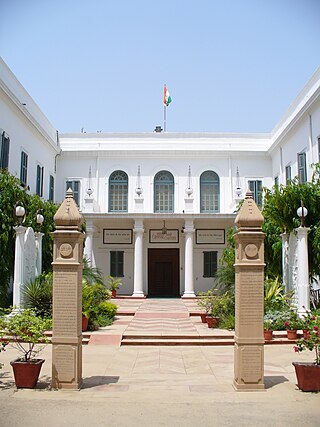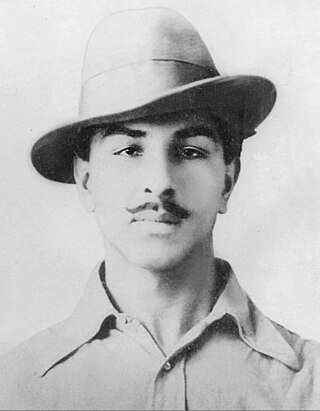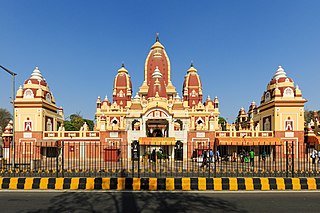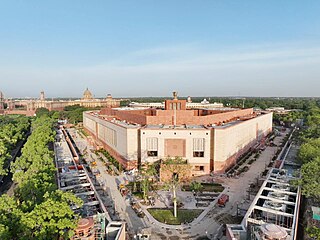
New Delhi, is the capital of India and a part of the National Capital Territory of Delhi (NCT). New Delhi is the seat of all three branches of the Government of India, hosting the Rashtrapati Bhavan, Sansad Bhavan, and the Supreme Court. New Delhi is a municipality within the NCT, administered by the NDMC, which covers mostly Lutyens' Delhi and a few adjacent areas. The municipal area is part of a larger administrative district, the New Delhi district.

Janpath, is one of the main roads in New Delhi. It starts out as Radial Road 1 in Connaught Place, adjacent to Palika Bazaar, and runs north–south perpendicular to Kartavya Path. Originally called Queen's Way, it was an important part of Lutyens' design of the administrative New Delhi, upon the inauguration of new capital of India in 1931. Janpath Market is one of the most famous markets for tourists in New Delhi. The market essentially is a long line of boutique stores selling products which are hard to find in the malls and multi-chain stores of the city. The long line of boutiques is for budget travellers and shoppers, buyers of handicrafts and garments, curio and numerous Indian-style fast-food places. It was created during the Construction of New Delhi.

7, Lok Kalyan Marg (7LKM), formerly 7, Race Course Road, is the official residence and principal workplace of the Prime Minister of India. Situated on Lok Kalyan Marg, New Delhi, the official name of the Prime Minister's residence complex is Panchavati. It is spread over 4.9 hectares of land, comprising five bungalows in Lutyens' Delhi, built in the 1980s, which are the Prime Minister's office, residency zone and security establishment, including one occupied by Special Protection Group (SPG) and another being a guest house. However, even though there are 5 bungalows, they are collectively called 7, Lok Kalyan Marg. It does not house the Prime Minister's Office but has a conference room for informal meetings.

Smriti Zubin Irani is an Indian politician and former actress, fashion model and television producer. She was Minister of Women and Child Development from 2019 to 2024, and also Minister of Minority Affairs from 2022 to 2024. She previously served as Minister of Human Resource Development, Minister of Textiles, and Minister of Information and Broadcasting. She was the youngest minister in prime minister Narendra Modi's second ministry in 2019.

Hindustan Times is an Indian English-language daily newspaper based in Delhi. It is the flagship publication of HT Media Limited, an entity controlled by the Birla family, and is owned by Shobhana Bhartia, the daughter of K. K. Birla.

Safdar Hashmi was a communist playwright and director, best known for his work with street theatre in India. He was also an actor, lyricist, and theorist, and he is still considered an important voice in Indian political theatre. He was an activist of the Students' Federation of India (SFI).

Gandhi Smriti, formerly known as Birla House or Birla Bhavan, is a museum dedicated to Mahatma Gandhi, situated on Tees January Road, formerly Albuquerque Road, in New Delhi, India. It is the location where Mahatma Gandhi spent the last 144 days of his life and was assassinated on 30 January 1948. It was originally the house of the Birla family, Indian business tycoons. It is now home to the Eternal Gandhi Multimedia Museum, which was established in 2005.

Raj Ghat is a memorial complex in Delhi, India. The first memorial was dedicated to Mahatma Gandhi where a black marble platform was raised to mark the spot of his cremation on 31 January 1948 and consists of an eternal flame at one end. Located on Delhi's Ring Road, a stone footpath leads to the walled enclosure that houses the memorial. Later the memorial complex was expanded to include other memorials for other prominent people including Lal Bahadur Shastri, Charan Singh and Atal Bihari Vajpayee among the others.

The Laxminarayan Mandir is a Hindu temple located in New Delhi, India. The presiding deity in the temple is Laxminarayan i.e., Vishnu along with his consort Lakshmi. The temple was inaugurated by Mahatma Gandhi. Gandhi ensured that members of all castes would be allowed in the temple. It was built by Jugal Kishore Birla from 1933 and 1939. There are also small shrines on the sides dedicated to Shiva, Ganesha, Hanuman and Buddha.

Gole Market is a neighborhood in the heart of New Delhi, India built within a traffic roundabout by Edwin Lutyens in 1921. It is one of New Delhi's oldest surviving colonial markets and is considered an architecturally significant structure. The dodecagonal market was built in the axis planned by Edwin Lutyens as part of New Delhi's layout. Peshwa Road, Ramakrishna Ashram Road, Shaheed Bhagat Singh Road, and Bhai Veer Singh Road are four radial roads leading from the market.

Krishna Kumar Birla was an Indian industrialist of the Birla family.

Safdarjung Airport is an airport in New Delhi, India, in the neighbourhood of the same name. Established during the British Raj as Willingdon Airfield, it started operations as an aerodrome in 1929, when it was India's second airport after the Juhu Aerodrome in Mumbai. It was used extensively during the Second World War as it was part of the South Atlantic air ferry route, and later during Indo-Pakistani War of 1947. Once situated on the edge of Lutyens' Delhi, today, it has the entire city of New Delhi around it. It remained the city's main airport until 1962, when operations shifted to Palam Airport completely by the late 1960s, as it could not support the new bigger aircraft such as jet aircraft.
The Civil Lines is a residential area and one of the 3 subdivisions of the Central Delhi district of Delhi in India. It is one of the 12 zones under the Municipal Corporation of Delhi. It was the hub of European-style hotels in the city until New Delhi came into being in 1911. The official residence of the Lieutenant Governor of Delhi is also located at Raj Niwas Marg, Civil Lines.

Lutyens' Delhi is an area in New Delhi, India, named after the British architect Sir Edwin Lutyens (1869–1944), who was responsible for much of the architectural design and building during the period of the British Raj, when India was part of the British Empire in the 1920s and 1930s and 1940s. This also includes the Lutyens Bungalow Zone (LBZ).

Green Park is an upscale affluent neighborhood in South Delhi, India. The locality is divided into two parts i.e. Main and Extension. The neighbourhood registered a 4.4% growth in residential sales and was featured alongside Greater Kailash, Defence Colony, Vasant Vihar and Anand Niketan in the 2019 edition of Knight Frank's quarterly report on prime luxury residential properties in various megacities around the globe. Property rates have always been high in this colony due to the numerous facilities available. Builder floors and independent villas cost anywhere between INR 6–70 crores in this colony. Rental rates are also very high making this residential area among the most expensive pin codes of New Delhi.

The National Gandhi Museum or Gandhi Memorial Museum is a museum located in New Delhi, India showcasing the life and principles of Mahatma Gandhi. The museum first opened in Mumbai, shortly after Gandhi was assassinated in 1948. The museum relocated several times before moving to Raj Ghat, New Delhi in 1961.
The National Herald is an Indian newspaper published by The Associated Journals Ltd and owned by Young India Limited a company by Rahul Gandhi and Sonia Gandhi and Shiva Publications a partnership firm by Vishnu Goyal & Rekha Goyal. It was founded by India's first prime minister Jawaharlal Nehru in 1938 as a tool to win independence. It was banned by British government in 1942 during the Quit India movement. It was one of the major English language newspapers in India after the end of the British Raj, and occasionally published op-eds authored by Nehru. The newspaper ceased operations in 2008 for financial reasons. In 2016, it was relaunched as a digital publication. The newspaper has been linked to and controlled by members of the Indian National Congress political party.

Delhi–Meerut Expressway or National Expressway 3 is India's widest 96 km long controlled-access expressway, connecting Delhi with Meerut via Dasna in Ghaziabad in India. The 8 lanes old stretch of National Highway 9 (NH-9) up to Dasna is widened to 14 lanes. The fourth phase of the expressway is built on a new alignment from Dasna to Meerut – a six-lane stretch joining Meerut bypass. The 28 km (17 mi) stretch between Nizamuddin Bridge and Dasna is one of the most congested areas in the NCR. The total project cost is estimated to be between ₹8,000–10,000 crores.

The 17th Lok Sabha was formed by the members elected in the 2019 Indian general election. Elections, all across India, were conducted in seven phases from 11 April 2019 to 19 May 2019 by the Election Commission of India. Counting started officially on the morning of 23 May 2019 and the results were declared on the same day.

Tolstoy Marg is a road in the Connaught Place, New Delhi area.


















